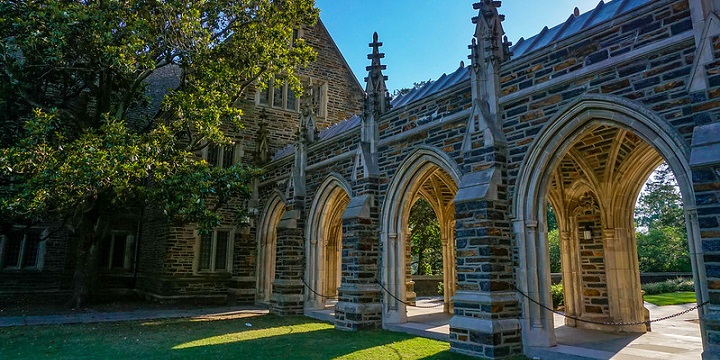
Duke University. Photo: Ilyse Whitney / CC BY 2.0.
The controversial veto of a pro-Israel student group at Duke University was upheld by a wide margin in a Wednesday night session of the student government, two days after the new Students Supporting Israel (SSI) chapter was denied recognition over a recent social media post.
SSI Duke was initially recognized by the Duke Student Government (DSG) on Nov. 10 — a decision revoked on Monday by the body’s president, who accused the fledgling group of “singling out” a Duke sophomore in a social media post.
That veto was upheld after a Wednesday senate debate with 37 votes in favor, 10 abstentions and 8 absent senators, The Duke Chronicle reported early Thursday. It was the first such veto of a new student group since 2016, according to the paper.
The post at issue came in response to a Duke sophomore who shared on social media news of the pro-Israel group’s chartering as evidence of the school promoting “settler colonialism.”
In reply, an SSI Duke account then reposted an image of the comment, and called on the student to “please allow us to educate you on what ‘settler colonialism’ actually is and why Israel does not fall under this category whatsoever. These types of narratives are what we strive to combat and condemn, which is why Duke’s chapter of Students Supporting Israel has been officially established & is here to stay.”
<
>
<
>
The response, DSG President Christina Wang had told student senators, was “evidence that the group singled out an individual student on their organization’s social media account in a way that was unacceptable for any student group and appeared antithetical to the group’s stated mission to be welcoming and inclusive to all Duke students, and educational in mission and purpose.”
On Wednesday, a wide majority of the senate agreed with the rare decision to revoke the group’s recognition.
Students Supporting Israel national slammed the news in a statement late that night, arguing that the “Duke student government created a standard that wasn’t applied to any student club at the university — not this semester, not this academic year, but ever.”
“Today it starts with SSI, but tomorrow half of the clubs on campus will be held at risk of being closed down,” the group said. “The only ‘crime’ SSI students did, was to call out a lie about Israel that was shared on a public platform.”
The national group, which has chapters on over 160 college campuses, added that it would “work to overturn this poor, ridiculous, and outrageous decision, and we are looking forward to SSI Duke to becoming one of the largest, outspoken, pro-Israel clubs across North America in the next semesters to come.”
Duke SSI co-founders Alanna Peykar ad Alex Adhoot presented a statement at Wednesday’s debate, saying that the group’s conduct was “inappropriate” and would not be repeated in the future. But, they added, “our mission as Students Supporting Israel is to be a clear and confident pro-Israel voice on Duke’s campus, to educate students about Israel and its culture and to support students in grassroots pro-Israel advocacy.”
“In the future, we plan to conduct ourselves in a more professional manner, while staying in line with DSG’s standards and our group’s mission,” Ahdoot said.
Speaking to The Algemeiner on Tuesday, before the senate’s vote, Duke SSI President Alanna Peykar argued that the episode itself showed the need for the group’s presence on campus.
“Personally I do think it is our responsibility as a Duke organization to act in a professional manner, but I also think that because of our lack of experience, this should have been handled differently,” she said. “When it came to our attention, the mistake that we made — we immediately tried fixing it. And this has been completely blown out of proportion by them.”
“They’re using the word Zionist as if it’s some bad, unspoken word,” she added. “And that’s upsetting to us.”
Miriam Elman, Director of the Academic Engagement Network advocacy group and a member of the SSI Faculty Advisory Board, told The Algemeiner that it was “not the first time that a pro-Israel, Zionist group was denied the right to form,” noting a 2019 incident at Williams College that prompted a Title VI complaint.
“The issue for them isn’t how recognized student organizations should or should not engage with individual student commentary on social media platforms, which is appropriate to clarify, but rather that Zionist perspectives shouldn’t be tolerated at Duke,” Elman argued.
She pointed to a letter to the editor published in the Duke Chronicle and penned by Duke Students for Justice in Palestine (SJP), which called the Duke SSI social media post a “product of Zionist organizing’s fundamental nature.”
“If SJP is allowed a platform so too should SSI,” Elman argued. “Of course, everyone should be supporting viewpoint diversity and all students should have the right to express their identities.”
Defending the Senate’s decision, which leaves Duke SSI unrecognized by the university and ineligible for funding, a DSG senator insisted during Wednesday’s debate that “the decision was based on the action of the group and not based on any ideology for which the group stands for,” the Chronicle reported.
Another student noted the presence of groups like Duke Friends of Israel and Students for Justice in Palestine, both chartered by the university.
Duke University did not immediately return The Algemeiner’s request for comment.



Leave a Reply
You must be logged in to post a comment.